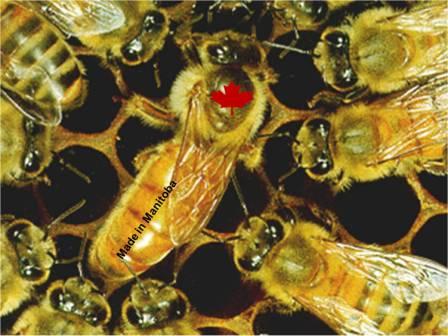Choosing Select Honey Bee Stock
The debate over the access to imported honey bee queens has generated two schools of thought. Some think it is impossible to be profitable if we do not have access to imported queens in early spring and some who believe breeding your own queens is the only way to keep bees. However, there is a way of bridging the gap between the two groups that allow the merits of both schools of thought to create a new way of thinking about purchasing queen honey bees.

- Take queens that demonstrate those characteristics and put them into the breeding programs of major queen exports. A new breeding program will have to be developed to keep the genes pure but also taking care not to create inbreeding problems. Canadian drone mother lines would have to be maintained to try to have enough Canadian genetics in the drone population to mate with the queens with Canadian genetics.
- To have more beekeepers make late season splits in order to take full advantage of local queen breeding. A substantial change in the way many Manitoba beekeepers manage bees would have to occur. Currently breeding queens in Manitoba does not start till mid May but more commonly does not start till early June. Meanwhile many Manitoba beekeepers start replacing failing queens and making new colonies before most local queens are available. Most Manitoba beekeepers that raise their own queens do not sell queens because there has been no market and there is no market because many beekeepers feel they cannot wait for local queens to become available. The proverbial what came first the chicken or the egg scenario.
There are several things happening today that may make the timing of this initiative better than it has in the past:
- There are several countries such as Chile that would be good candidates for incorporating Canadian stock into their programs.
- The border to US queens is open and many of the queen exporters marketing to Canada have a good working relationship with their Canadian customers.
- We have more Manitoba beekeepers asking for and wanting to try local queens.
The biggest obstacle will be to get more Manitoba beekeepers to start raising their own queens. Working with the Manitoba Beekeepers’ Association and local queen producers, we are going to put on more queen rearing workshops and provide Manitoba beekeepers with more opportunities to purchase local queens. Some of the local bee supply outlets have expressed interest in stocking local queens in their stores. This has generally not been the case.This is Phase One of an ongoing project to get more beekeepers to use selected stock in their beekeeping operations. Phase Two will involve developing pilot projects to quantify the value of using locally selected stock. Phase Three will be looking at what incentives can be implemented to encourage greater use of locally adapted bee stocks. The end goal is to promote greater self sufficiency in the management of honey bee stocks in Manitoba.
